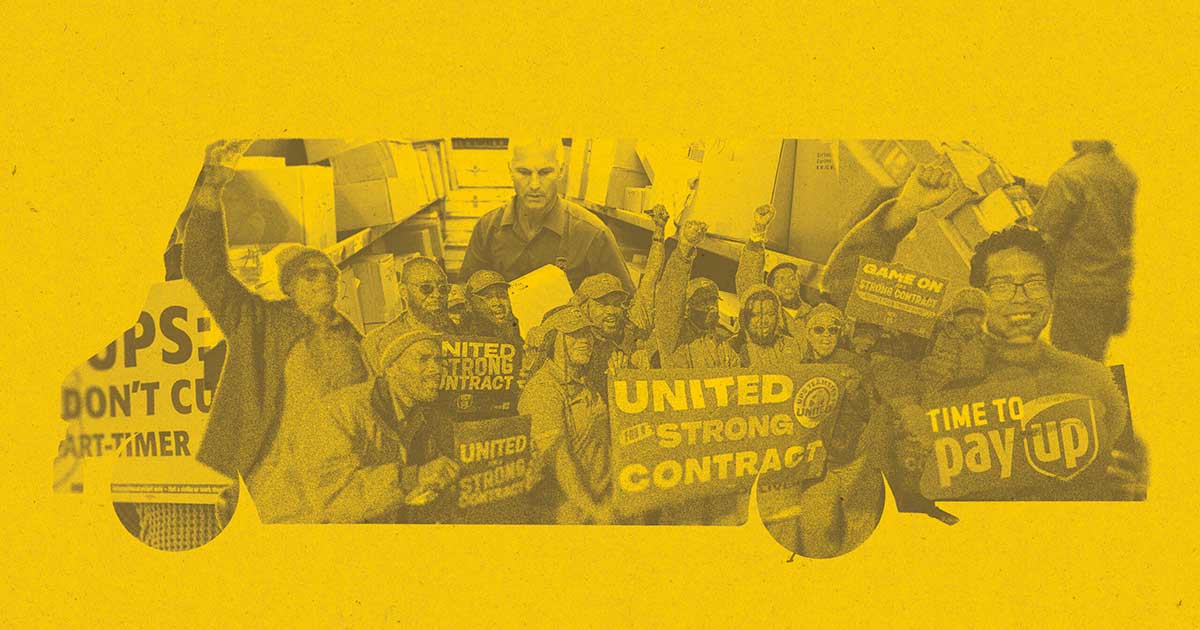The contract for some 340,000 UPS workers, organized by the International Brotherhood of Teamsters (IBT), is set to expire at midnight on July 31st. In preparation for a possible walkout, Teamsters across the country began casting strike ballots earlier this week.
A strike by UPS Teamsters would be the largest labor action at a single firm in the history of the U.S.
To better understand of how Teamsters are thinking about and preparing for a possible strike, we spoke with ‘Big Will’ Pina, a 30 year veteran of the UPS Teamster rank-and-file.
Black Rose / Rosa Negra (BRRN): Would you describe who you are, where you are based, how long you have been working at UPS, and what kind of work you do there?
Will: My name is Will Pina, a 51 year old out of southeast Los Angeles. I have been working for UPS for 30 years come August. I am a full time package car driver. Worked my way up through the part time ranks.
BRRN: What does your average day look like on the job? Given your experience, can you describe some of the changes that you have seen in your years working at UPS? What have the conditions been like over the last few years?
Will: My average day starts at 9 AM and ends anywhere from 7 PM ’til 9 PM. Some of the changes have come through new technology. Drivers had to have knowledge of the routes and how they worked, now most of them are lined up by computer routing programs. They know exactly how many miles it takes, how many packages and stops per hour you should be doing. The technology does not take into account road conditions or weight of the packages.
Routes used to have larger time allowance so basically now it’s hard to break the route or make scratch. Drivers are usually regularly followed by management when these unrealistic expectations are not met. To say we are over supervised and harassed would be a huge understatement. If it were not for my union and the protections our contract provides I probably wouldn’t be working there.
Also on a side note; I am very proud to serve my area in a historic brown neighborhood and that’s another reason I have chosen to stay a package car driver.
Covid has really affected all of us in my local. When the pandemic first broke out many drivers went on disability fearing catching it because they had underlying health conditions or bringing it back home and infecting their families. For the rest of us that stood behind and worked through it we were met by overloaded routes. All of us were working 12 hour shifts in dangerous conditions. In my case, I serve many clinics and a hospital where I risked myself and my family on a daily basis. I know of at least 2 co-workers that died and one supervisor, that really shook me psychologically.
UPS was sending us to die for their profits without batting an eye. I also had family members that caught covid and passed away. In spring of 2021 suffering from burnout and depression I suffered from heat exhaustion that put me on disability for two months. That was my experience during the pandemic. One good thing to come out of it was our solidarity and new found militancy to fight the bosses after that incredibly abusive time period.
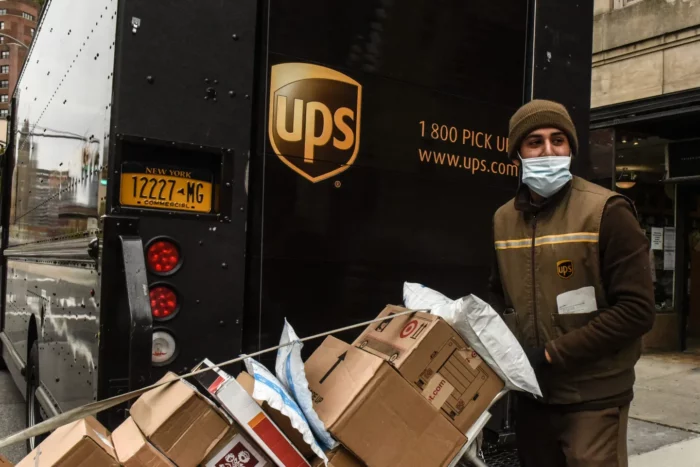
BRRN: The last time the UPS-Teamster contract came up for negotiation was 2018. Can you tell us about how that played out?
Will: In the 2018 contract negotiations led by Jimmy Hoffa jr. and package director Ken Hall, the union had a really cozy relationship with UPS. That relationship led to a concessionary contract, one that created a second tier of lower paid drivers creating division amongst the rank-and-file. The contract was very problematic to say the least.
A vote no movement was born after the rank-and-file got wind of the givebacks, I was very proud to be part of that. We immediately went into action and started informing the members to vote no! The day came to cast our votes once they were counted we shot down the business friendly agreement. The excitement of what we accomplished stunned us, it was a great feeling of accomplishment.
The following day the IBT announced they were invoking the two thirds rule and ramming the contract through anyway. A quick summary of the two thirds rule: when there is not a clear majority of votes cast amongst all the members in the union, the IBT can impose the contract even if those that participated voted no. The disappointment was felt through our movement but we didn’t let them forget about our displeasure of what they had just done to sell us out.
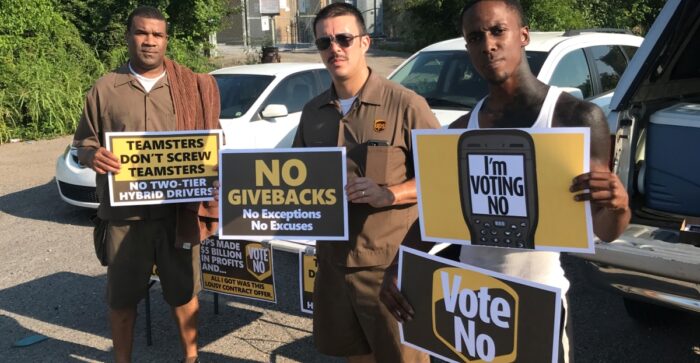
BRRN: You are a member of Teamsters for a Democratic Union (TDU), a reform caucus in the union. Can you tell us a bit about your involvement in the caucus?
Will: Yes I am a member of TDU. I joined about two years ago. Even though I have been active in the union, I only recently joined. TDU has played a major role in the union for many years. They spearheaded the 97 strike that’s when I first learned of them being out in the picket lines and reading Teamster Voice. I felt it was way past time, it also helped that fellow trade union radicals had joined up around the same time. One of our most recent reform victories was in the last IBT convention the two-thirds rule I mentioned earlier was abolished. That is a huge win for the rank-and-file.
BRRN: The contract covering more than 340,000 UPS workers is set to expire on July 31 and IBT officially started collecting ballots for strike authorization this week. How are you and your Local preparing for the possibility of a strike?
Will: To prepare for a potential strike this past Sunday our Local had contract action training at the hall. It was open to all Southern California UPS Teamsters. If you’ve ever been to Labor Notes and taken any of their classes on organizing, that’s what it was like. We are also planning parking lot rallies, passing out educational materials, that sort of thing. All of those things have been already happening but they are going to be ramped up.
The strike authorization vote, as you already know is under way and it should be an overwhelming yes vote. The vote tally should be done in about a week’s time. To prepare themselves, the activists in our union have been visiting local picket lines for workers in other industries like performers at Medieval Times, Writer’s Guild pickets in Hollywood, and Amazon Teamsters in Palmdale.
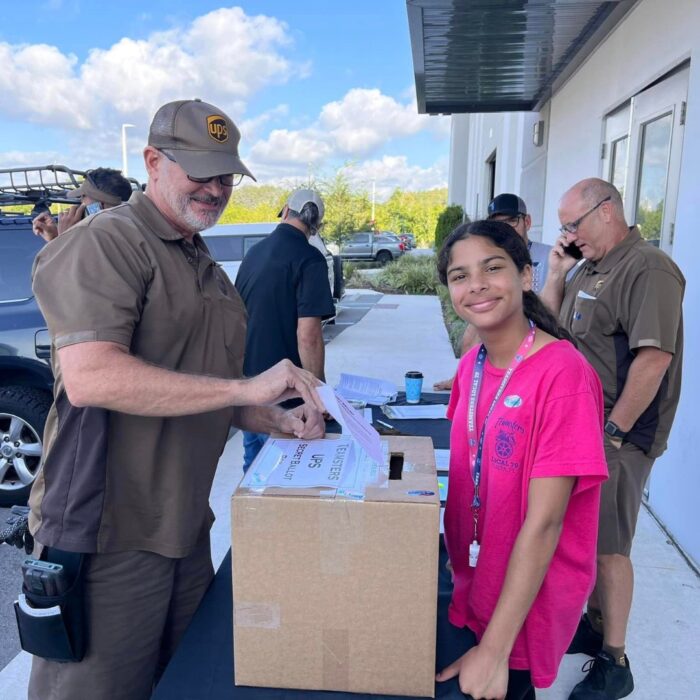
BRRN: Are workers organizing independently of IBT to prepare for the possible strike?
Will: Workers are organizing independently of the union, especially the part timers. To show solidarity they have “red shirt Friday” they all wear red to show the bosses they are united and not to be messed with. It’s also a symbolic gesture over the starvation wages they get paid, most of them are in the red financially. I am very proud of these very important workers. They are the backbone of this multi billion dollar corporation. This contract will be about their issues.
BRRN: As a rank-and-filer, what issues are most important to you in the coming contract fight? Is there anything that you feel could have been included in the demands, but was not?
Will: The issues that are important to me are working conditions, the heat, invasive technology like cameras in the truck cab. In a recent development in our negotiations the union secured air conditioning in new vehicles across the board, that’s a big deal. Unfair production standards and harassment – that’s a big one for me, I have been fighting that my whole career.
I can’t specifically say what issues have been left out because the union is operating under a NDA, or a non disclosure agreement. That’s another fight activists in our union are going to take on. Negotiations should be 100% transparent.
One thing I would like to see under the economic package is wages be tied to inflation. The cost of living is going up and this job isn’t getting any easier, not to mention UPS keeps on breaking record profits year after year.
BRRN: In your experience, to what extent has the lead up to a possible strike mobilized rank-and-file members? In other words, have you seen more active participation on the part of the rank-and-file in recent months?
Will: The rank and file have been very active, yes. In my time at UPS I would have to go back to the ’97 strike to see this much involvement by the members. Our union hall is packed every month. I am also seeing members volunteer in our new Amazon organizing committee. You will not see an empty seat there either. Really exciting time to be in the labor movement.
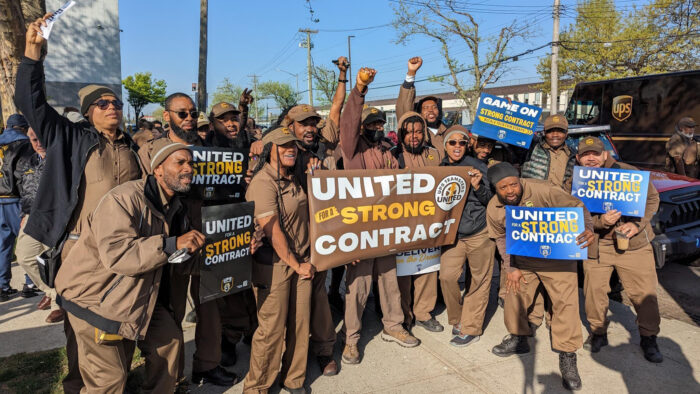
BRRN: The United Auto Workers (UAW) are also approaching the expiration of contracts with the ‘Big 3’ automakers in September. Are UPS workers watching these developments?
Will: I would have to answer yes. We are watching what both unions do, as you know the UAW just elected a reform slate that is also fighting sell out contracts that were pushed by corrupt union officials. We had a UAW worker join our TDU class at the Spring Labor Notes Troublemakers School. Also another brother by the name of Sean Orr out of local 705 Chicago invites UAW rank-and-file to “Teamster Thursday” meetings in order to build solidarity. That type of worker cooperation will be crucial to rebuild militant fighting unions.
BRRN: If a strike does happen at UPS, what are some ways that outsiders can support it?
Will: If a strike does happen people could support us by simply showing up at our picket lines and helping us out there. Donations will be crucial, water, donating to our strike fund is another way once it gets set up. Bringing food will help! Community support will be crucial if we are going to win this fight. This will be a historic strike if it does happen that should motivate allies of the labor movement to show up and be part of history!
‘Big Will’ Pina is a 30 year UPS Teamster veteran and union radical in Southeast Los Angeles. You can follow him on Twitter @bigwill72.
If you enjoyed this article, we recommend our interviews and analysis covering other recent labor actions, including massive strikes at both Rutgers University and the University of California.

